|
When I was a college music major, I didn’t give a thought about sitting practices in the music room.
Neither did any of my instructors. But I changed. Within three days of the start of my first full-time general music gig in a tony private day school, I knew that I needed my music students sitting in chairs and not on the floor. How do have kids sit in your classes? I've learned that if I can get kids to properly sit in chairs in an elementary school, they will usually perform, think, and demonstrate the attitude of someone at least one or two grades above where they are. Unfortunately, chairs are not always possible. Sometimes there are just not enough chairs in a school. At my last school, I used to borrow chairs from the multi-purpose room. The floors and the carpets in schools are generally filthy and germ-laiden. Younger children have a way of having soiled their pants, and there's no way to stop that from seeping into a rug. Even if there were music room chairs available, we would start the year with the chairs stacked in the back of the room. My students would have to repeatedly demonstrate that they were ready to sit in chairs. That meant they had to be able to handle sitting in rows on the floor for at least two weeks. After that we would add the chairs. And if their management of chairs started to slip, I could suggest that maybe we need a sitting refresher on the rug. As far as playing guitar in elementary schools, chairs are a must for kids. The exception is kindergarten where start strumming with guitars that are flat on the floor. By the way, I never bought 1/2 size or 3/4 size guitars. I always purchased full-sized dreadnaughts, knowing that kids aren't going to get any smaller; they're only going to get bigger and grow into the instrument. Don’t even talk to me about ukuleles. Extended sitting on the floor can be painful for a child. If kids have to sit on the floor, they need to be up and about at least every seven or eight minutes. “Go time” breaks in my room always included the freedom to talk and walk around the room. When I first started directing middle school chorus , sitting practices were a low priority for a few months – I had my hands full. But I changed. Choral rehearsals always required chairs. We would stand about one-third of the rehearsal. We had three seating positions: Seated position three, where we sat in a more relaxed way as if we were in a classroom, restaurant, or movie theater. Seated position two, where we sit “up straight” with our backs against the chair and our feet flat on the floor. Seated position one, where we sat with our back away from the chair, our bottoms closer to the front of the seat, and our feet flat on the floor. Seated position three was where we were most of the time in our rehearsals. I should have been more of a stickler about sitting – but I wasn’t. Or about kids walking a little too fast in the hallway. I let that slide, too. Or about kids wanting to talk to their friends in class. That’s why they had “Go time”. Optimally, change comes through the experience of empathy. Ultimately, change comes through the experience of being in the room. You change once you experience hundreds of kids who are strapped into chairs with wheels. You change once you experience kids with no ability to ambulate on their own. You change once you experience kids who struggle to make themselves understood. You change. And you discover a world of appreciation that you never knew existed. And while we can’t change the world, we can approach our little acre and endeavor to make it better for those who inhabit it through music. When you are beyond frustrated with the behaviors of a kid, take a beat, and remind yourself that they can change for the better. It might not be on your watch. It may be way down the road. But every little bit of positive encouragement we provide will add to future encouragement and lead to change in your students. You can change. Your students can change. And in the hands of positive, proactive people, change can be good. This post is not intended to be a vocal lesson on nasal singing but rather a constructive approach to singing and sound reinforcement.
As many of you might know, pronounced nasal qualities in a voice often originate in a weak soft palate. Sometimes it can hang too low and accentuate nasal tones. The typical way to approach this problem is to strengthen the soft palate, usually by doing some yawning exercises that add muscle tone to the area. All those nasal sounds get more pronounced when singing into a microphone. Disclaimer: I am not a sound engineer – but I do know how to fix common PA problems in nine out of ten situations. Fixing a nasal sound is a small part of the skill referred to as “ringing out the PA” where all sound problems you encounter are solved and the overall sound is optimized. First things first: practicing proactive sinus maintenance is the best advice I'm giving here. The more stuffy your sinuses are, the more nasal your sound will be. Daily use of saline nasal spray never hurts, almost always helps, and keeps your sinuses wide open. Make sure your mic is squarely in front of your mouth. You need to “eat the mic” which means your lips are so close to the mic that you will be occasionally brushing up against the mic grill. Not all mics are created equal. Use a good mic with reliable frequency response - something like a Shure SM58. Don’t have your PA volume too high. Be certain that the speakers are in front of the mics and pointed toward the audience. Using EQ If you are singing into a mic and the nasal characteristics of your voice are too pronounced, try adjusting the EQ (equalizer) first on the vocal channel and then on the master EQ. If the nasal sound is just on vocals, look to the channel strip EQ to fix the sound. If all the vocals and instruments have an abundance of nasal qualities, the solution will be in the mater EQ. To do fix those nasal sounds with an EQ, you’ll need at least an 8-band master EQ and/or a three or four band channel strip EQ. A channel strip with two simple bass/treble knobs won’t be much help. Better boards will often have a three or four band channel strip EQ as well as a mid-range parametric EQ, enabling to fine tune frequency selection. While a four-knob channel strip EQ will divide the audible frequency range of the channel into four large chunks, parametric EQs let you boost or cut an exact, narrow band of frequencies. If the offending tones are in every channel, it is time to adjust the master EQ. Use an eight-band or parametric EQ and isolate the offending nasal frequency. Start with investigating the usual suspects: 800Hz, then 1,100Hz, and then 250Hz. Begin with a flat EQ on both the channel strips and master EQ. Sing a short phrase containing the offending tones over and over as someone slowly raises/boosts the above frequency bands on the master EQ. If there is no change in the sound, return the slider or knob to flat. When you find the slider/knob that accentuates the problematic sound as you boost it, you’ve found the culprit! Return it to flat and slowly lower it a few dB. If you are adjusting the master EQ, dropping the fader any more than five dB can have deleterious results on the overall sound of the PA. You always want to be conservative when adjusting EQ. Any severe cuts or boosts can lead to a “wack-a-mole” situation with your sound: adjusting way too many sliders with too few solutions. The solution is almost always in one slider. If the vocal EQ sounds smoother or you would actually like some more 800Hz, 1,100Hz, or 250Hz, there is one other thing I want you to experiment with that can slightly color the sound: how you position the mic grill between your mouth and nose. Usually we eat the mike when we sing – dead on with our lips. But try positioning it a few eighths of an inch higher, a little closer to your nose and sometimes brushing up against it. I’m not saying park the mic in one place and leave it but find the notes that get sweeter when you move the mic head tad closer to or away from your nose. You will able to add some ‘umph’ to the vocal sound if needed. I’m not saying this will work with every voice but I think it’s an invaluable experiment. If you’ve never experimented like this before with your mic placement and EQ, you just might like the results. If you haven’t read “Lessons from a Trumpet Jury or a Thing Happened on My Way to Mitchell Hall - Part One”, give it a good skim before reading Part Two.
It was freshman year at the University of Delaware and I was a first-year music education major, majoring on trumpet. I was in the wings of Mitchell Hall, waiting with my accompanist, Charlotte Joslin, to walk out and play my first trumpet jury. I was performing a Rafael Méndez trumpet solo. Walking on stage, the two spotlights obliterated anything in the house that now had adapted crypt-like qualities. I played the piece. After I was done, I stood there silently peering into the lights. I heard footsteps approaching from the house. It was the low brass professor, a rather sizable man, who spoke with an Alabama drawl. He walked right up to me, maybe two feet away from my face, seemly unaware of the concept of personal space. Everything about him exuded disgust and cheap aftershave. “That is the worst music I have ever heard in my life.” Pause. “There is no place for you in the world of music.” I didn’t move or break eye contact with him. As he glared at me, Charlotte began to cry. I could hear her whimpering as she slid down behind the piano desk. I finally responded. “Are we done here? Is that it?” He flared his nostrils, widened his eyes, but said nothing more as he walked off stage and back into the cavernous darkness of the house. Afterwards, I took Charlotte out for a burger and Coke to help make up for her moments of distress caused by me. My Reaction – or Lack Thereof What this low brass teacher didn’t know was that I had survived a seven-year gauntlet of sadomasochistic nuns who, in comparison, made his sauce look weak. If he thought he was going to impress me with his cliché insults, he had to contend with the creative jailers who had repeatedly beat me and made me ingest dusty holy water. This is not to say that his words had no effect on me. I placed him in context with other musicians I had met in my career. My career, you ask? Yes. I already saw myself as a musician and knew that I had marketable skills. Before I had ever stepped into a college class, I had already played close to a thousand gigs. Even more importantly, one of the things I learned while paying my dues was that you criticize the performance, not the performer, a concept that had eluded this low brass teacher on his way to a teaching gig in a college. Could I have played the jury better? Of course. But that’s what I said after almost every gig I had ever played previous to that jury: I could have done it better – and I will next time. Take Aways for Music Educators Never let anyone define you. When confronted with negativity, don’t take the bait - always choose to eschew the drama. If you are going to predict a student’s future, tell them that they will be successful. Criticize the performance, not the performer. Praise the effort anyone makes in any field of endeavor when they travel the road to its destination without giving up along the way. Training hard will give you confidence and mettle when you’re eventually in the arena. If you only pretended to train hard and still choose to enter the arena, all bets are off and instead of confidence, you will quickly learn what fear tastes like. Realize that all who are the most successful in achieving their goals demonstrate a curious trait: they help others achieve their goals. Your goals belong to you and no one else. At the end of the day, let others be responsible for their goals; you be responsible for yours. Your successes belong to you as but you will only experience the true magnitude of your success when you share your success with those who helped you along the way. It was freshman year at the University of Delaware and I was a first-year music education major, majoring on trumpet. I was in the wings of Mitchell Hall, waiting with my accompanist, Charlotte Joslin, to walk out and play my first trumpet jury. As I stood there, I wished I was holding my double bass and reflected on how I got to this moment.
I knew how to play trumpet and had played lots of gigs on trumpet through my high school years, but I was no stellar classical trumpet player. I was an accurate sight reader and more of a jazz or pop player rather than a classical player. My trumpet heroes were Louis Armstrong, Bix Beiderbecke, Miles Davis, Snooky Young, Marvin Stamm, and Chet Baker. Each of them had different, distinctive approaches to their instrument and sounded very different than the classical model of tone, Maurice André . My start on trumpet was atypical. A Thing Happened on My Way to Mitchell Hall As a child, by fourth grade, I had large protruding upper teeth. My mother took me to the orthodontist who had an interesting observation after my appointment. “I've seen this sort of thing before. You have two options, Mrs. Holmes. The first one is your son gets braces. Second is he learns how to play trumpet.” My mother was puzzled as she tried to remember if it was trumpet or clarinets that I wanted to play. She asked the orthodontist “How much will the braces run?” “Somewhere in the neighborhood of $2000 to $2,500.” “And do have any idea how much trumpets run?” The orthodontist shrugged. “I've heard you can get them for about $125.” My mom thought for a moment. “We’ll get back to you on the braces.” And within a week, I had a brand new used trumpet. I started taking lessons that summer with Mr. Zollie, a gruff tenor sax player who sounded like Vido Musso and had an Italian marching band that played in the Little Italy area of our town. He also played in bars and roadside joints and specialized in a rock sound that lent itself to him standing on the bar and walling away on “Night Train”. He had Polaroids to prove it. There he was, channeling his inner Louis Prima, playing his tenor over his head, standing on a bar, with adoring people club patrons holding their Schlitz in wonderment at his musical prowess. Seemed legit to me. I never heard Mr. Zollie ever play an instrument that summer. He didn't know how to play trumpet. But he knew how to follow my “A Tune a Day” beginning trumpet book and had a lot of confidence that I would be able to play. The problem was my teeth. They still painfully cut into my upper lip when I played. As I would put that 7C mouthpiece up to my mouth and blow, my spit valve ran blood red. I had horrendously bad tone, so much so that when I practiced in my room at home and suddenly stopped, I could hear my parents laughing downstairs. One day in fifth grade, it all clicked. I'm assuming that my teeth had moved enough so that the overtone series fell into place. The summer before my freshman year, my band director told me that starting as a freshman, I was going to learn how to play tuba because I was the tallest brass player going into ninth grade and wouldn’t drop it. I was game. Before I left the director’s office, he stopped me and said, “Oh, and by the way, you're also going to learn how to play upright double bass.” I frowned and asked why would I want to do that. He smiled. “Because you will be able to play in orchestra and orchestra has thirty-seven members with only four boys.” I quickly revise my thinking. “Yeah, that double bass does sound pretty good.” I ended up studying double bass privately and learned how to make a significant amount of money playing it, from Dixieland gigs to folk mass gigs to pit bands to jazz trios. When I arrived at the University of Delaware to audition on double bass, one of my auditioners, their trumpet instructor, knew that I play trumpet. Even though I had brought my upright bass to my college audition, he feigned ignorance and asked “It says on your form here that you also know how to play trumpet. Can you play something for us today on trumpet?” I responded with “Well, I don't have my trumpet with me and I haven't really prepared anything.” He smiled. “Well, I just happen to have a trumpet break here. Why don't you play something from memory.” So I picked the most obnoxious piece of music that I had memorized, something that I really did not enjoy playing, but I could play fairly well, and I hope it would say to them that I didn't have any taste in music. I played the first trumpet part from Leroy Anderson’s “Bugler's Holiday”. By measure eight, both evaluators from the University exclaimed, “You’re in!” As soon as they said that, I knew I should have played Herb Alpert’s “Spanish Flea”. The reason they were pushing me to play trumpet was economic. While the university had a student orchestra, they did not have a string program at the time. If the department I had decided that I could be a double bass major, they would have had to pay out-of-pocket for my out-of-house private study, and that was not happening. Everything about music at Delaware revolved around marching band, PR image, and the money it drew from alums who were deeply committed to the rah-rah football experience. The school didn't want a string program that would siphon any talent or budget away from the music department’s wind and percussion contingent. Thankfully that this changed over the years. I played in string orchestra for several years. Some years I played tuba in marching band; some years, trumpet. I also played second trumpet in the jazz ensemble because the second chair was the improvising chair. Marching band and jazz ensemble performed some of my arrangemts and one of my compositions was performed at a senior recital. At that time, I was the only major who was doing those things. I loved being versatile. So here I was standing in the wings at Mitchell Hall, the primary performance Hall on the University campus, my first freshman trumpet jury moments away. To be concluded in “Lessons from a Trumpet Jury or a Thing Happened on My Way to Mitchell Hall - Part Two” Ahhhh, sweet summer time!
The time to chillax, drift away, and . . . . start planning what music you’re going to do in the next year. May I suggest . . . plan what you are going to have in your back pocket. What you have in your back pocket refers to the idea of a song you can pull out on a second’s notice when a great song is needed. As the song goes, "You're never fully dressed without a song in your back pocket!" Or something like that. When do you need to pull a song out of your back pocket? How about when visitors unexpectedly show up in your class room or in the school. Superintendents, perspective parents on a tour of the school, politicians, grandparents, photo-ops, visiting educators from other schools, Principals-for the day – all prime candidates for a polished back pocket song. And over my career, I did one for all the above. Pro tip: have more than one song in your pocket- you might need an encore. Then there is the time you have to pull that one special song out of your back pocket: “The” back pocket song. It has to be a solid vocal number that the kids love to sing, one they have memorized with a very recognizable intro lick. When kids hear an intro to a song that they love, they immediately buzz and smile because they know what’s coming is something they always look forward to. If it’s an up-tempo song, make sure it has a physical flourish at the end that ends on a freeze. If it’s a ballad, make sure that it builds to the last note and that the vowel sounds are as pure as you want to convey that your students are. Another great opportunity for back pocket songs is when there is a problem during a school assembly and there is an unexpected empty block of time that has fallen into your principal’s lap. Almost every principal I have worked for has never forgotten the day that their school singers saved the day. Every year in my elementary school, there were usually at least a half-dozen situations where there were hundreds of kids waiting for something. They were times like the startup of an assembly, waiting for field trip buses, lunch lines, waiting for buses that broke down at the end of the snowy school day where not only was I able to pull something out of my back pocket, I had to. My favorite was on those twenty degree winter days at 3:00 when hundreds of kids were bundled up in overcoats, parkas, and cinched hoods, waiting in the bus court for a fleet of late school buses that were stuck in snow somewhere. Kids would start to get rammy and teachers would nervously look at one another about how they were going to quell the rapidly rising energy in the mile-long line of impatient kids. I would often turn to two fifth graders, give them each a guitar pick, and tell them to RUN to my music room, bring back my guitar case and be sure that they carry it over their heads when they brought it back to me. As soon as the back of the bus line saw that guitar travelling in the hall, the positive expectant buzz was in the air: they knew that a song wasn’t far behind. "Mr. Holmes is gonna sing with us!!" Without taking off my winter top coat, I would get that guitar out, strap up, and immediately start working the line, singing all the favorite songs that all the kids from kindergarten to fifth grade knew. It felt like magic. Guess what was the best day when I pulled some songs out of my back pocket? My final day of teaching. It was a sweltering day in June. The kids had just given me a thunderous clap out through the entire school as I was privileged to lead the bus line for the last time at dismissal. Like every last day of the school year, there were hundreds of honks from bus horns, hugs, waves, and tears as each of the twenty-five school buses pulled out for the last time for the school year. Every bus but one. One bus was missing. The kids had to patiently sit in the broiling sun on the curb with Assistant Principal Roberta Jacobs and myself, waiting for their bus in the suddenly silent and still parking lot. After a minute, I knew exactly what to do. Two fifth graders came running out with my guitar over their heads, I worked the curb, and we shared some back pocket songs for the very last time. Finally after twenty minutes, the bus came and, along with my guitar, I waved good-bye for the last time. While I knew that having a bunch of songs in my back pocket was the result of me being proactively ready and planning in the summer time, I realized that it was the power of those songs and the power of all these positive kids, teachers, and administrators raising their voices together with me in hallways, classrooms, assembly halls, and yes, even curbs that was the REAL back pocket magic! |
AuthorBoyd Holmes, the Writer Archives
April 2025
Categories |
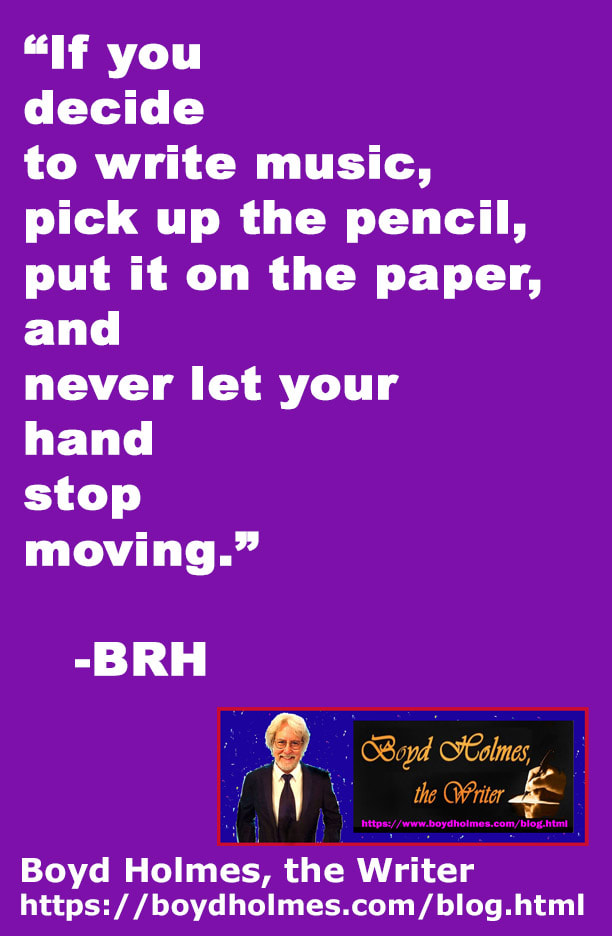

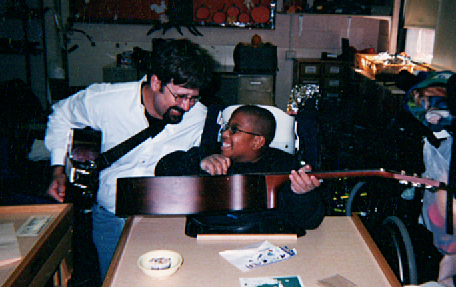
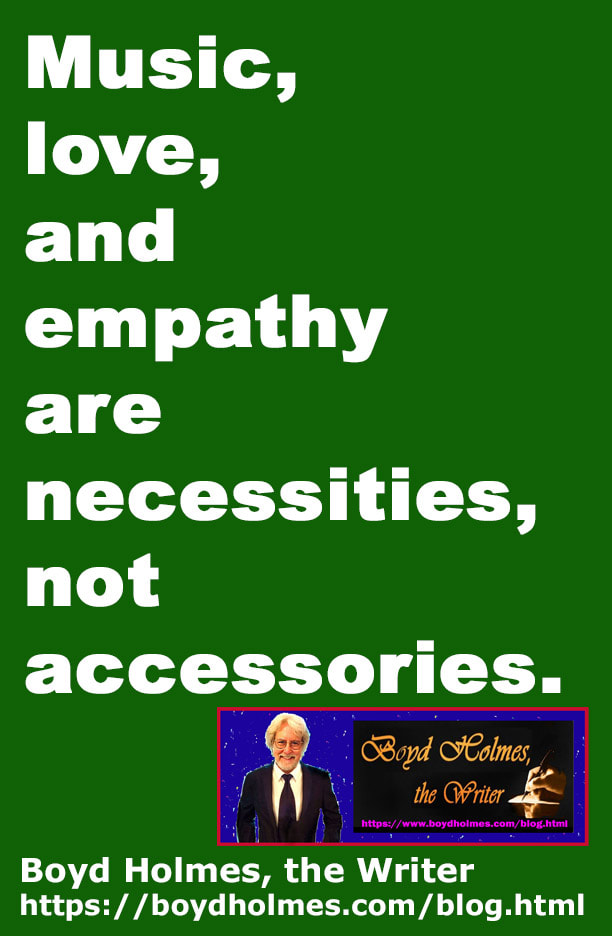
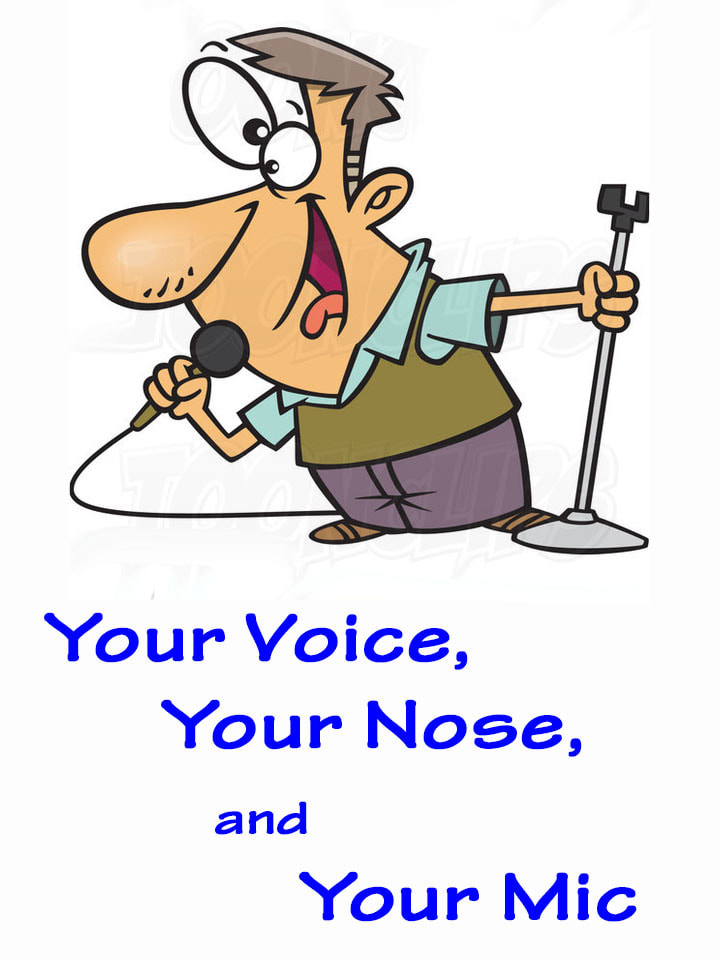
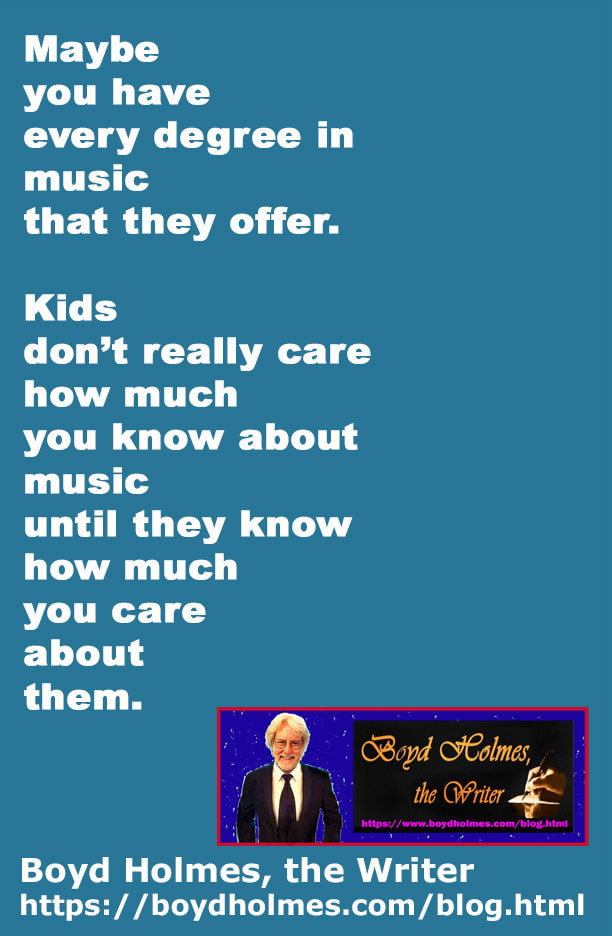
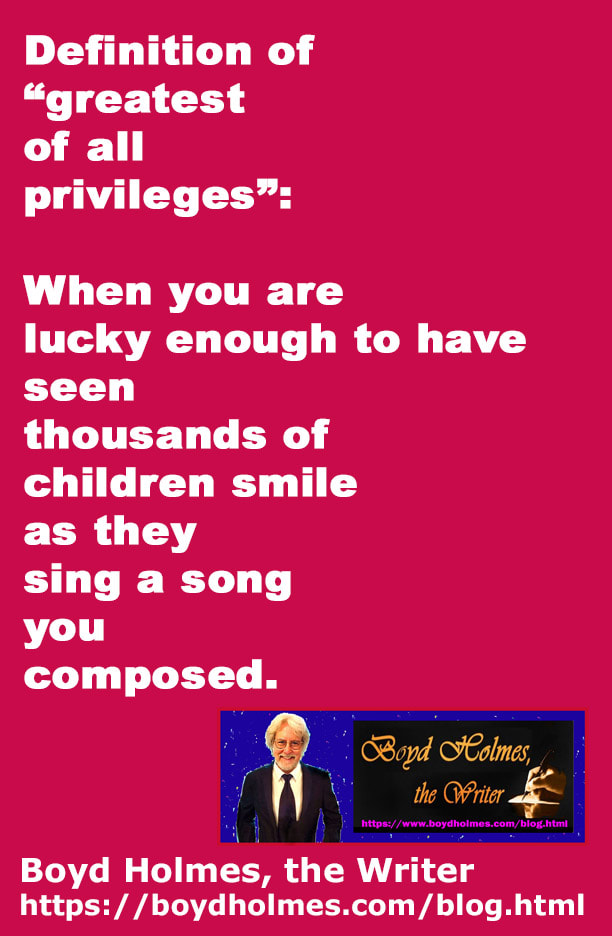
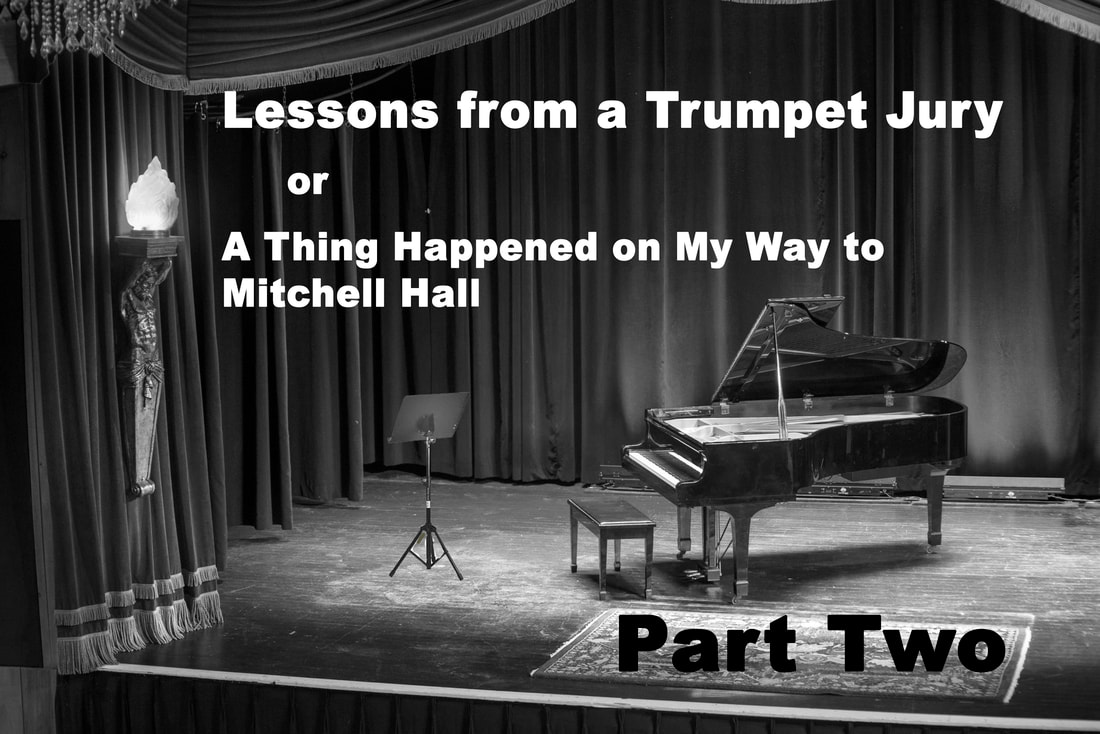
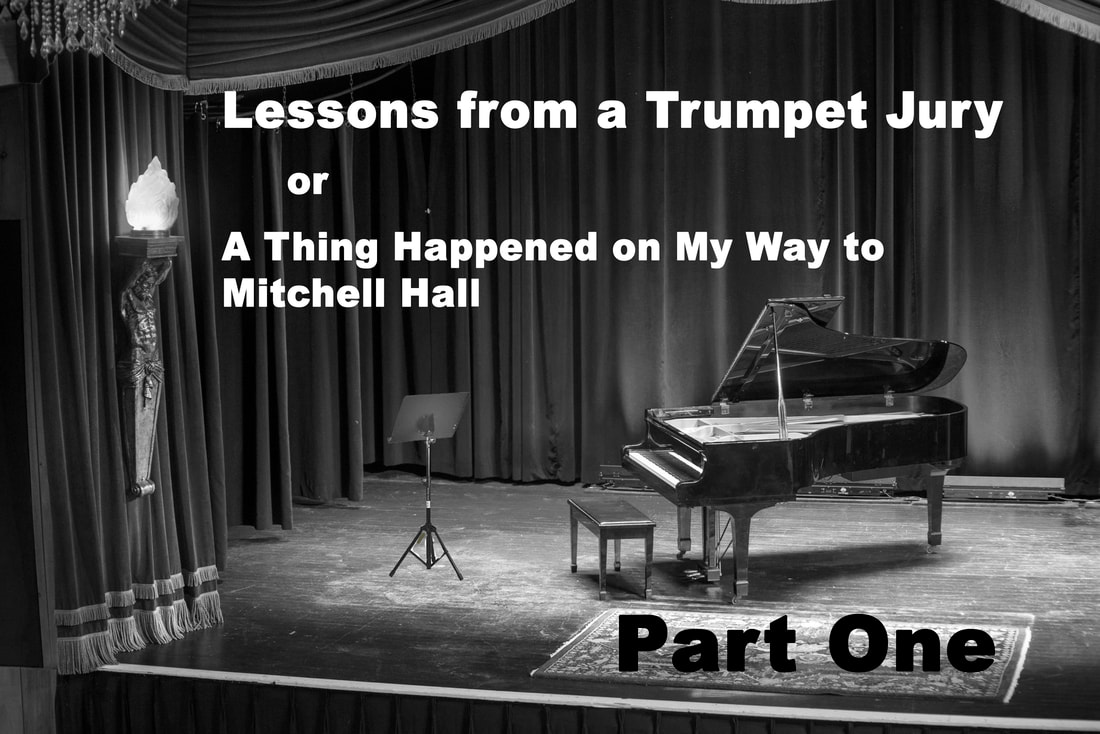
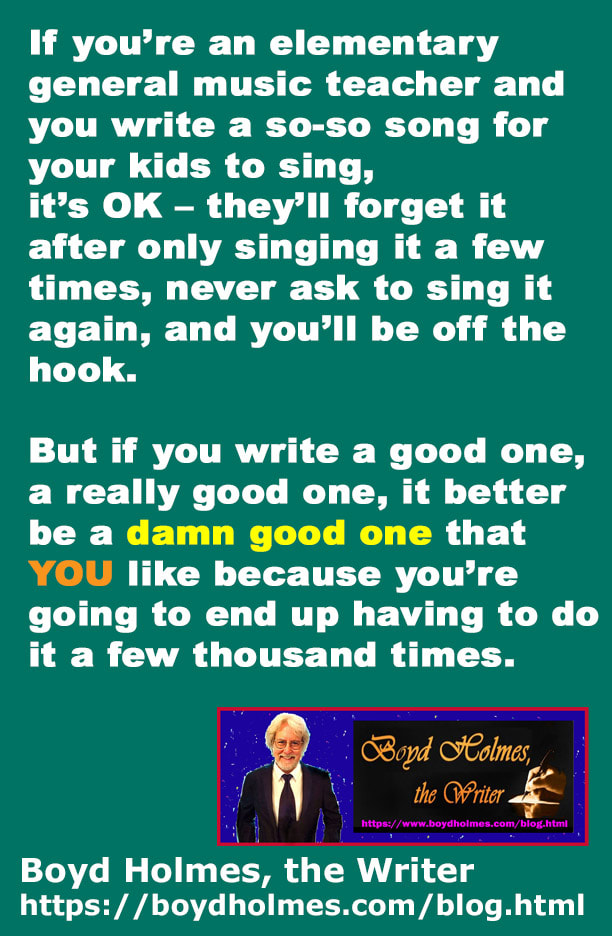
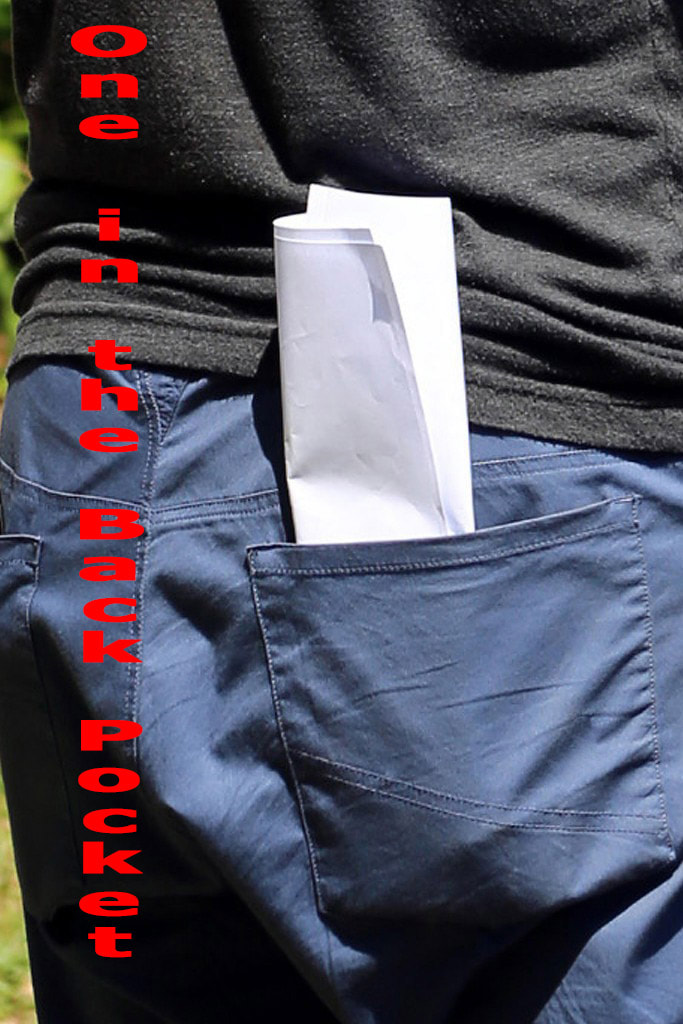
 RSS Feed
RSS Feed